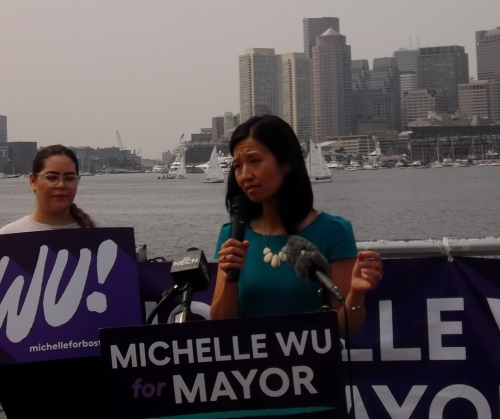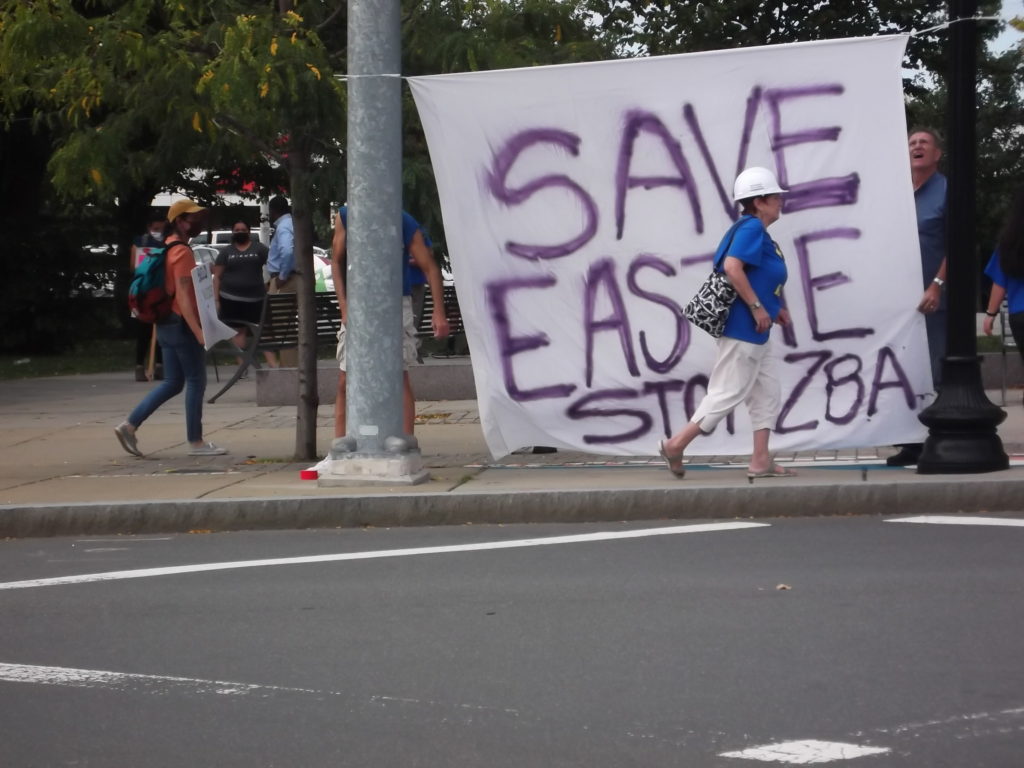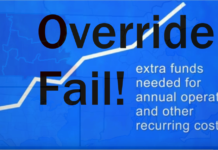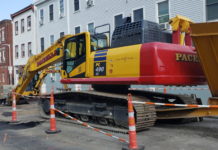by MATT ROBARE
SPECIAL TO EASTBOSTON.COM
New Boston Mayor Michelle Wu pledged to abolish the Boston Planning and Development Agency during her mayoral campaign, arguing that it is an unaccountable and misguided relic of the past: “Facing an affordable housing crisis, the worst traffic congestion in the United States and a climate crisis that threatens our very existence, the people of Boston deserve a city planning department that empowers communities and addresses these challenges . . . the BPDA has bolstered the city’s structural inequality to ensure that only a select few enjoy this unprecedented prosperity,” her position paper states.

The BPDA, nee Boston Redevelopment Authority, is certainly not anyone’s idea of a perfect city agency. At the time of its creation in the 1950s the economic and city planning theories it was created to implement were already on the verge of being discredited. Despite recent revisionist attempts to argue that the BRA paved the way for the city’s economic rebirth, it’s clear that the revival was largely if not entirely independent of the agency and their approach to redevelopment was ham-fisted and counter-productive.
Yes, they did demolish the West End on false pretenses, displacing thousand of working poor residents in order to provide private developers and Massachusetts General Hospital cheap land for luxury high rise apartment buildings and hospital expansions. Yes, they forced all the food wholesalers out of the Quincy Market and replaced them with a tawdry mall designed for tourists.

But so what? It was the best-practice at the time. No one’s suggesting abolishing public schools because they taught the Lost Cause. Hell, people even want Boston to go back to having an elected school board and neighborhood schools, two things that were very much out of fashion among Boston progressives for many years.
Wu is correct that Boston’s development process is broken and this brokenness is exacerbating unaffordability, but the recommendations and solutions proposed in the white paper are mostly bad, largely because the BPDA is not responsible for them.
Take affordable housing. According to the paper, “Instead of building the affordable housing its residents need, the City is encouraging a luxury housing boom.” This is true, but good luck finding anything specific tying it to the BPDA – the white paper points out that in Boston, planning, zoning and permitting are all done separately, which causes lengthy delays and adds costs. A ripe area for reform, but how is it the BPDA’s fault?
The white paper mentions several times that the Boston Zoning Code is outdated and doesn’t reflect the city’s needs. But the BPDA doesn’r run the zoning effort, the Zoning Commission does and its members are appointed by the mayor. It’s unclear how abolishing the BPDA would reform the other agencies.
A look at the Universal Hub archives gives an idea what the real problem is: back in April, the Zoning Board of Appeals rejected a proposal by a non-profit called Heading Home to build a 23-unit building for homeless families because the proposal didn’t include parking, despite the fact that people without homes also usually don’t have cars. UHub quoted one neighbor who attended the meeting as saying “They’re trying to shove this down our throats.” A scaled down proposal, with 20 units and eight parking spaces, was approved at the end of September. In November, the Zoning Board of Appeals rejected a proposal for a 31-unit building in Roslindale Square with nearly half below market rents because it didn’t have parking.
In January of 2020, a 14-unit apartment building was killed by the ZBA because of parking concerns and “neighborhood character”. “One resident decried Boston’s push to build more housing, saying the city should care more about long-term residents than ‘providing housing to outsiders who are trying to move into the city.’”
Read through the archives and a number of patterns emerge: the Zoning Board of Appeals applies an arbitrary standard – whether disallowing a roof deck because neighbors complain about noise from others or deciding that Roslindale Square needs parking; the local “community” opposes new development, especially affordable housing; excessive concern by neighbors and board members over concepts like “character” and “scale” that are vague and nebulous at best and are racist dog whistles at worst. And all too frequently, NIMBY concerns are pandered to by city councilors.
Here’s the big problem with scale and character in a city like Boston: 15 percent of an apartment building’s development cost is in land and 58 percent is in construction, according to the Greater Boston Housing Report Card 2015. Land is essentially a fixed cost, but construction can be made more or less efficient depending on how much construction gets done. In other words, a developer can build a lot of units at a low cost per unit or a few units at a high cost per unit.
And the ZBA, the neighborhood associations, city councilors, tenant organizations and other “concerned” citizens have made sure that in every possible case, the least number of apartments and condos get built. Naturally, what gets built ends up expensive. The equations need to balance.

It’s a wonderfully self-fulfilling cycle of BS: housing costs increase because the City doesn’t allow enough housing to get built; groups of white saviors and self-important activists oppose new development because of the rising costs; less housing gets built and costs go up even more. They can congratulate themselves on “saving the neighborhood” and still blame the consequences of their actions on development. One day I’m sure they’ll realize that the last 40 years of these tactics have been such an utter, abyssal failure that they will start advocating the destruction of existing housing stock to force prices down.
The BPDA alone seems interested in making sure that some housing gets built. That alone is reason enough for keeping them around.
The plan presented in the white paper would reduce housing production in Boston by further empowering neighborhood groups with a vested interest in keeping housing expensive. Instead of looking at the best practices of cities where housing is most affordable, like Houston, Atlanta or Phoenix, it draws on the best practices of New York and San Francisco! New York and San Francisco may be poster children of progressive politics, but they are not exemplars of affordability and inclusion. As a general principle, if one wants to see more affordable housing, one should do the exact opposite of the policies San Francisco has chosen. Yes, they’re more democratic, but it’s a democracy of homeowners whose ownership of scarce housing has made them multimillionaires.
If we really want to promote both more affordable market rate housing and build more deeply affordable housing, we need less opportunities for self-appointed community guardians – i.e. the older, wealthier, whiter people who overwhelmingly show up to community meetings – to veto new housing. Parking minimums need to be reduced around the city and eliminated entirely within a half mile of bus and train service. The City’s inclusionary development ordinance should be amended to allow density bonuses like similar ordinances around the country. Boston needs not only to be upzoned, but other zoning requirements need to be examined for their effects on costs. In addition, Boston should follow Cambridge and adopt a zoning overlay that allows affordable housing to be built as of right. Just as importantly, the suburbs like Newton, Brookline, Arlington and Milton need to start building more, as well – over 43 percent of multi-family permits in Massachusetts are in Boston, according to The Greater Boston Housing Report Card 2019, which is partially why land costs are so high. Building more out there will help take the pressure off Boston as well as provide new residents an alternative to get into bidding wars over condos in Dorchester and Roxbury.
Are their problems with the BPDA? Yes – the report identifies several, such as a lack of transparency and accountability when it comes to community benefits agreements. In addition, their approval process is lengthy and the requirement that projects need approval by the BPDA board and the ZBA creates more veto points.
Matthew M. Robare is a freelance writer in Brighton. Follow him on Twitter @MattRobare. You can read more of his work at www.mattrobarewrites.com.
Eastboston.com established 1995. Read EAST BOSTON News; updated daily
















